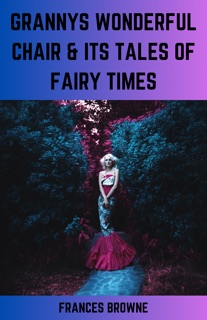"The writer of “Granny's Wonderful Chair” was a poet, and blind. That she was a poet the story tells on every page, but of her blindness it tells not a word. From beginning to end it is filled with pictures; each little tale has its own picturesque setting, its own vividly realised scenery. Her power of visualisation would be easy to understand had she become blind in the later years of her life, when the beauties of the physical world were impressed on her mind; but Frances Browne was blind from infancy. The pictures she gives us in her stories were created, in darkness, from material which came to her only through the words of others. In her work are no blurred lines or uncertainties, her drawing is done with a firm and vigorous hand. It would seem that the completeness of her calamity created, within her, that serenity of spirit which contrives the greatest triumphs in Life and in Art. Her endeavour was to realise the world independently of her own personal emotion and needs. She, who, out of her darkness and poverty, might have touched us so surely with her longing for her birthright of light, for her share of the world's good things, gives help and encouragement to the more fortunate.
In reading the very few details of her life we feel the stimulation as of watching one who, in a desperate fight, wins against great odds.
The odds against Frances Browne were heavy. She was born at Stranorlar, a mountain village in Donegal, on January 16, 1816. Her great-grandfather was a man of considerable property, which he squandered; and the younger generation would seem to have inherited nothing from its ancestor but his irresponsibility. Frances Browne's father was the village post-master, and she, the seventh in a family of twelve children, learning privation and endurance from the cradle. But no soil is the wrong one for genius. Whether or not hers would have developed more richly in more generous surroundings, it is difficult to say. The strong mind that could, in blindness and poverty, secure its own education, and win its way to the company of the best, the thoroughly equipped and well tended, gained a victory which genius alone made possible.
She was one of the elect, had no creative achievement crowned her triumph.
She tells us how she herself learned by heart the lessons which her brothers and sisters said aloud every evening, in readiness for the next day's school; and how she bribed them to read to her by doing their share of the household work.
When the usual bribe failed, she invented stories for them, and, in return for these, books were read to her which, while they seemed dull and uninteresting enough to the readers, built up for the eager listener those enchanted steps by which she was to climb into her intellectual kingdom.
Her habit was to say these lessons aloud at night, when every one else was asleep, to impress untiringly upon her memory the knowledge for which she persistently fought through the day.
There were no book-shops at Stranorlar, or within three counties of it, and had there been one, Frances Browne had no pennies for the luxury of books. But she had friends, and from those who were richer than herself in possession, she borrowed her tools. From the village teacher she learned French, in exchange for those lessons in grammar and geography which, her brothers and sisters had given away to her, in return for numberless wipings and scrubbings in the kitchen. Scott's novels marked an era in her mental life; and of Pope's Iliad — which she heard read when she was about fifteen — she says, “It was like the discovery of a new world, and effected a total change in my ideas and thoughts on the subject of poetry. There was at the time a considerable MS. of my own production in existence, which of course I regarded with some partiality; but Homer had awakened me, and in a fit of sovereign contempt I committed the whole to the flames. After Homer's the work that produced the greatest impression on my mind was Byr
















![My Share of the World. An autobiography. [A novel.] VOL. III.](https://is1-ssl.mzstatic.com/image/thumb/Publication/v4/a1/ae/ee/a1aeeee4-6d6d-e722-cfb8-752dcacd8840/9780699548052_cover.jpg/270x270bb.jpg)



![My Share of the World. An autobiography. [A novel.] VOL. I](https://is1-ssl.mzstatic.com/image/thumb/Publication/v4/b9/bb/f1/b9bbf10b-a16d-aa90-3047-58f22d20cd7b/9780699548014_cover.jpg/270x270bb.jpg)





![My Share of the World. An autobiography. [A novel.] VOL. II.](https://is1-ssl.mzstatic.com/image/thumb/Publication/v4/98/32/d9/9832d914-74d2-7c3a-3326-46c4c3501c29/9780699548021_cover.jpg/270x270bb.jpg)




![The Hidden Sin. A novel. [By Frances Browne.] vol. I](https://is1-ssl.mzstatic.com/image/thumb/Publication/9b/9c/12/mzi.vbrxiseh.jpg/270x270bb.jpg)











![The Hidden Sin. A novel. [By Frances Browne.] Vol. II](https://is1-ssl.mzstatic.com/image/thumb/Publication/04/8b/e5/mzi.qfohpbhl.jpg/270x270bb.jpg)